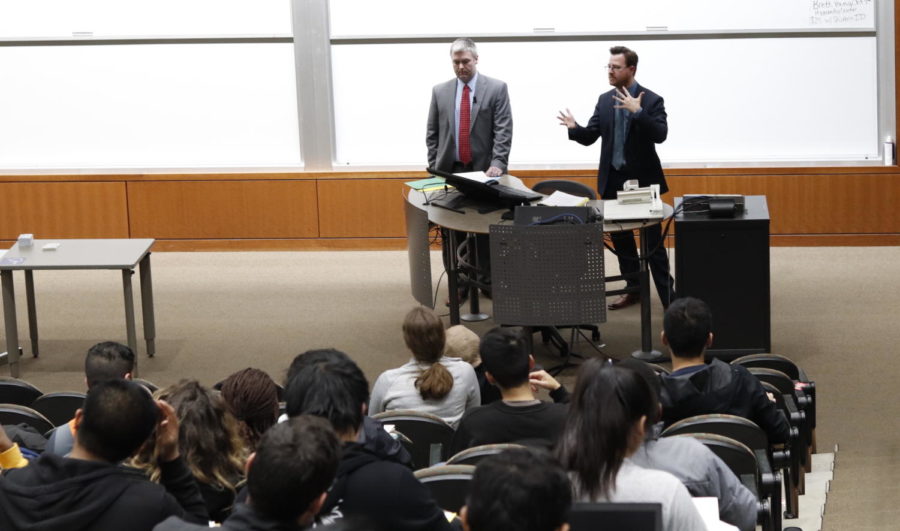Immigration attorneys host seminar on work visas to Iowa State international students
Jonathan Moore (left) and David Gluckman are immigration attorneys specializing on work visa petitions. They gave a seminar to Iowa State international students in the Gerdin Business Building Thursday night.
October 4, 2018
For international students that are planning to find a job and stay in the United States after they graduate, two immigration attorneys presented a seminar depicting different work visas in Gerdin Business Building Thursday night.
David Gluckman and Jonathan Moore, who are immigration attorneys, were the two speakers. They both specialize in employment-based visa petitions and green card applications, temporary visa petitions and applications and family-based visa petitions and green card applications.
Gluckman started the seminar by introducing the significant for international students to obtain Optional Practical Training (OPT) which allows up to 12 months of employment after graduation, and for those holding science, technology, engineering or math degrees to get 24 additional months.
“OPT is a great opportunity for building relationships with employers who potentially may offer you a full-time position,” Gluckman said. “The best thing is, employers don’t have to do anything. You only need to do the paperwork with your university.”
The seminar’s primary focus is H-1B visa, which requires employees have at least a bachelor’s degree or equivalent and working in a job requiring a degree. H-1B visa has a three-year initial period of validity with a three-year extension for a total of six years.
The United States has 85,000 new H-1B visas available each fiscal year, and there is a crucial date for students to keep in mind: April 1.
“Pre-filing for new quota starts on April 1,” Gluckman said. “So talk to your employers at least before January and get the process started.”
Moore said many students are under the impression that only large companies offer H-1B sponsorship.
“Students sometimes think only companies like Google, Apple and Boeing offer H-1B,” Moore said. “It’s not true. I’ve worked with firms with only ten workers that still successfully sponsored international students. So don’t limit your job search only to those major companies.”
Universities, non-profit organizations affiliated with universities (such as research facilities and hospitals), non-profit organizations, engaged primarily in basic or applied research and governmental research organizations are exempt from the H-1B quota. These organizations can file H-1B petitions for their employees at any time.
After discussing H-1B visa, the two speakers introduced several alternative temporary visa options to the audience:
– O visa is a visa type requires extraordinary ability in arts, athletics, science and business. Available to athletics, researchers, university faculty, renowned artists and outstanding business people.
– H-1B1 visa is a visa type has special quota of 6,800 visas available to citizens of Chile and Singapore.
– TN status is a visa the allows citizens of Canada and Mexico work in the United States in TN status in certain designated jobs.
– E-3 visa is a visa allows the citizens of Australia to qualify. There is a quota of 10,500 for this visa, and it is unlikely ever to be exhausted.
Albulena Basha, graduate student in economics and sustainable agriculture, is currently holding a visa for foreign scholars called J1. She is from Kosovo and wants to get her doctorate after graduation.
“I mainly want to know if I’m able to transfer my status as a scholar to a student without any complications,” Basha said. “There are a lot of hoops to jump when switching status, so I’m glad our school provides this opportunity for me to talk to real attorneys, instead of going through dozens of Google searches.”
Samantha Hirschman is a domestic graduate student in education and staff at the business career service center. She came to the seminar with the intention to learn how to better support different identities.
“I don’t think people realize international students are under a different level of pressure when they are trying to find jobs,” Hirschman said. “I think being able to acknowledge that is the first step to being supporting.”
Hirschman said she wants more Iowa State staff to come to the presentation and learn the basic process international students must go through.
“Although it’s not the initial intent of tonight’s presentation, I would like to see more staff or faculty present,” Hirschman said. “It would’ve been something nice to know about as university employees.”
















